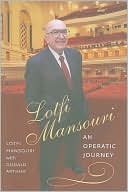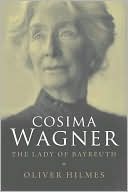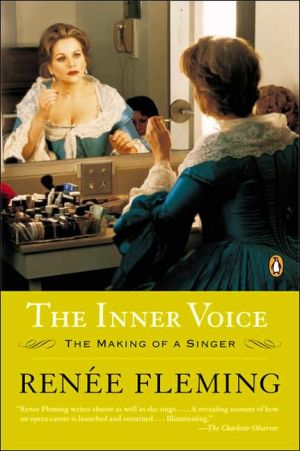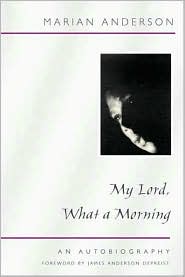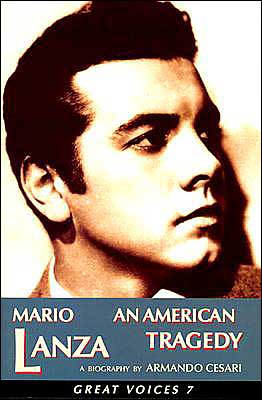Maria Callas: An Intimate Biography
Maria Callas continues to mesmerize us twenty years after her death, not only because she was indisputably the greatest opera diva of the 20th century, but also because both her life and death were shrouded in a Machiavellian web of scandal, mystery and deception. Now Anne Edwards, well known for her revealing and insightful biographies of some of the world’s most noted women, tells the intimate story of Maria Callas—her loves, her life, and her music, revealing the true woman behind the...
Search in google:
“Even those with little interest in opera or celebrity will be swept into this tale.... Edwards’s riveting book is sure to prompt new interest in Callas’s dramatic life.” —-Publishers Weekly“[Callas’s] tumultuous life could be the subject of an opera, and Edwards negotiates it with the skill and ease of a seasoned conductor.”—-Booklist Maria Callas, the prima donna who continues to mesmerize the world twenty-five years after her death, was born to Greek immigrant parents in New York City in 1923. Callas was a classic ugly duckling who struggled for years before transforming herself into a glamorous, almost mythical opera star.From her early days as a poor, overweight singer with an undeniable yet uneven singing talent, to her physical and emotional breakdowns, and her passionate love affair with Aristotle Onassis, who would discard her for the widowed Jacqueline Kennedy—-Anne Edwards brings readers a revealing portrait of the hardships, loves, and triumphs of Maria Callas.Anne Edwards, who has been hailed as “the queen of biography” by Kirkus Reviews, is the author of many bestselling biographies, including Katharine Hepburn: A Remarkable Woman and Ever After: Diana and the Life She Led. She currently lives in Beverly Hills, California. Publishers Weekly Edwards (Katharine Hepburn), author of several biographies of iconic women, including Princess Di and Judy Garland, delivers a fresh, highly engrossing take on one of history's most legendary divas. Even those with little interest in opera or celebrity will be swept into this tale of an "awkward, fat girl" who became the "slim, lionized diva who... changed the face of opera forever." While there are more than 30 biographies of Callas (1923-1977), Edwards's perhaps most handily pierces fable with fact. (Most notably, she produces evidence refuting Nicholas Gage's claim in his recent Greek Fire that Callas had and lost a son by Onassis.) Edwards chronicles Callas's life from her humble beginnings as a pharmacist's daughter in Astoria, Queens, New York, to formal music training in war-torn Greece to phenomenal triumph in the world's most renowned opera houses. She also provides descriptions of opera plots, costumes and sceneries, and admirably captures the economics, passions and egos that drove the major players in Callas's life, including her most famous paramour, Aristotle Onassis, and her publicity-seeking, self-martyring mother. "There was something of Norma Desmond and Sunset Boulevard about Maria's life after Onassis and her voice died," Edwards writes, describing Callas's lonely final years. Edwards recounts, too, the star's death at 53, her dispiriting funeral ("A high wind rose just as the ashes were being offered to the blustery sea, and some of them flew back and landed on the clothes of the mourners") and the grifters who swooped in to feed on Callas's financial remains. Edwards's riveting book is sure to prompt new interest in Callas's dramatic life. Two 8-page b&w photoinserts. Agent, Mitch Douglas. (Aug. 20) Forecast: Certain to lure Callas cultists, but its appeal is likely to be much wider; several of Edwards's biographies have been bestsellers, and this one, too, has strong commercial potential. Copyright 2001 Cahners Business Information.
\ Chapter One\ \ \ New York City: 1923-1937\ \ \ Unlike the other Greek immigrants on the huge ship takingthem from Athens to New York City, George and EvangeliaDimitriadis Kalogeropoulos and their six-year-old daughter,Yacinthy (Jackie) occupied a cabin in the first-class section. MrsKalogeropoulos's Persian lamb coat hung in the small wardrobe alongsidetwo formal gowns she had brought with her. Packed in the steamertrunk in the hold of the ship were her silver candlesticks, tableware, iconsand lace dinner cloths. Litza, as the five-months-pregnant MrsKalogeropoulos was familiarly known, was not going to arrive in aforeign land as a poor, dispossessed refugee. Coming to America had beenher husband's idea and he had sold all their assets to finance their movebefore consulting her. Young and headstrong (only twenty-five at thetime), she had fought bitterly in an attempt to get him to reverse his decision.George refused and, if she had not been carrying their child, shewould have kept Jackie and remained with her family.\ 'My family have always been at the front of things,' she would proudlyrepeat to her young daughter. 'Your grandfather, my father, was ageneral, God rest him, as was your great-grandfather DimitriosDimitriadis. Your great-uncle Kostas Louros was the king's physician andI ...' She would sigh, her surprisingly blue, expressive eyes suddenly filledwith resentment, 'I married a pharmacist.'\ Litza was only seventeen when a cousin introduced her to the ratherdashing-looking George Kalogeropoulos who, though nearly twiceherage, had just graduated from the School of Pharmacy at the University ofAthens. A handsome man with auburn hair, a roguish moustache and agleam in his well-set dark eyes, George was intrigued by her youth, herenergy and her prestigious background. He came from the small town ofMeligala in the Peloponnese and his family was poor. For many years hehad been employed as a pharmaceutical assistant in a chemist's shop inMeligala, the only pharmacy in thirteen counties and an exceptionallysuccessful business. The owner, an elderly man, had offered to sell it tohim if he could get his degree. This was what George had been workingtowards and saving penuriously for. Now his dream was about to berealized.\ Shortly after Litza and George met, her beloved father, General PetrosDimitriadis, died suddenly of a stroke. George was filled with compassion.The lively, beautiful young girl he had known was in visible distressand unusually vulnerable. Her father had been the most importantperson in her life. Nothing had been too good, or too difficult to obtain ifit was for 'his Litza', the youngest of his eleven children. Litza foundGeorge a comforting substitute and on 7 August 1916, two weeks afterher father's death, they were married in a small private service in theGreek Orthodox Church, the bridegroom anxious to return to his newposition as owner of the chemist's shop and the bride happy to find anescape from the deep mourning in the Dimitriadis household. Her familywere horrified that Litza would not wait out a proper mourning periodand her brothers warned her that George had a roving eye. Strong-willedas always, and with George's reassurance that she would have a houseand a maid when they married, she could not be deterred. She wore aplain, white, unadorned gown out of respect for her father and there wasno wedding reception. One brother, who had accused her of beingpregnant, was haughtily excluded by her from the ceremony.\ The wedding couple spent a week on the small island of Aegina, whichwas a short ferry ride from Piraeus, before going to Meligala. The homeGeorge had promised her was actually two floors over the pharmacy andwas connected by a staircase that led from the first floor to the entranceof the shop. Litza was disappointed but there was compensation: notonly would she have a maid but she could redecorate the upper twostoreys. Doubts of her wisdom in marrying George set in almost immediately.In Athens she had seen only his charming side, how well he lookedand carried himself. Now, she realized that they came from unrelatedworlds; could she ever be happy living in his more prosaic one?\ Although not wealthy, the Dimitriadis family were considered upper-middle-classand were of patrician heritage. They had produced some finemusicians along with army officers and political figures. One brother,who unfortunately had committed suicide over a lost lover, had been arising poet. The Dimitriadises' claim to culture was of great pride to Litza.She was 'fanatical about anything to do with the stage', liked to displayher musical knowledge and to discuss the well-known artists she hadmet. Meligala had little to offer of either an intellectual or an artisticnature. Litza managed to drag George away from the pharmacy to thecoastal city of Kalamata, where there was a theatre visited by touringcompanies. Secretly, she harboured dreams of one day going on the stageherself. It was not an unusual ambition for a Greek woman. This was at atime when, almost every other profession being exclusively male, thetheatre was one of the rare careers a young woman could dream of entering.But Meligala, and the restraints of her marriage, offered little hopethat such a fancy could ever be realized.\ The town was picturesque — white buildings that caught the strongmorning sunlight and cast graceful cool shadows in the heat of summerafternoons, winding roads and several verdant oases. Well-tended olivegroves flourished just beyond the town borders and their owners produceda few wealthy residents, none of whom extended any graciousinvitations to the newlyweds. Litza's unhappiness was apparent.\ On 4 June 1917, ten months after their marriage (proving her brotherwrong), their first child, Yacinthy, was born in Athens because Litza didnot trust the local physician. Three years later, on 27 June 1920, Litzagave birth, again in Athens, to a much wanted son, named Vasily. Bynow Litza was certain that her marriage to George had been a mistake.Still dapper-looking and of a sympathetic nature, with the proprietorshipof the store and fatherhood he had lost the spirit of fun that had firstattracted her and, as he flirted with all the pretty women whom he servedin the shop, her brother's warnings left her uneasy. She turned her attentionto little Vasily, a handsome child with large, blue, dreamy eyes and agentle smile who, she believed, was fated to be either a poet or a musician.Jackie was left very much on her own, a situation that did not seemto disturb the little girl who found her mother cold and diffident at sometimes and volatile at others.\ 'Then the world was limited to the shady interior of our house, thedarkened rooms and the chatter of the servants [the Kalogeropoulosesnow had a maid, a cook and a handyman who also delivered prescriptionsfor George],' Jackie would later remember. The staircase was herworld for it led to the sweet-smelling room where her father passed hisdays. To her, it was a 'magic shop full of beautiful jars and bottles, of glasscabinets cluttered with packets and tubes', and she loved to watch herfather 'graciously serving the ladies who came to the shop, carefullywrapping their parcels, passing them over with a bow and murmuredcomment, twirling the end of his black moustache with a little smile'.\ The one thing that bound George and Litza was their children; especiallyVasily, the son George so prized, who at three was reading well and couldpick out a nursery tune on Litza's beloved piano. Then the unspeakablehappened. The child contracted typhoid fever. The family was frenzied asthe boy's condition quickly deteriorated. Neither the medications that thelocal doctor prescribed nor George's potions culled from other doctors hecontacted helped. Within a week, Vasily was dead. The house was throwninto a darkened cavern of mourning. Litza declined into such a state ofdepression that she refused to leave her room and the grey days brought bya harsh early winter only intensified the gloom that spread throughout thehouse.\ It was Easter 1923 when Litza found that she was once again pregnant.She harped on incessantly about returning to Athens where this son (shewas positive that God was sending her a replacement for Vasily) couldhave the advantages of which the brother he would never know had beendeprived. There were fierce rows with George, floods of tears would fall,bitter words were exchanged. The household was a war zone. Litza was inher fifth month when George sat her and Jackie down at the dining-roomtable and informed them that he had sold the pharmacy and their apartment,for which he had received a very good price, and — believing thiswould sweeten the shock — had purchased first-class tickets on an oceanliner leaving from Athens for America in three weeks' time. He wantedthe three of them and the coming child to have a new life and so he hadcontacted an old friend from his university days in Athens, Dr LeonidasLantzounis, an orthopaedic surgeon, who had emigrated to New York theprevious year and was at present working to secure his American licence.Dr Lantzounis had arranged a job for George with a pharmacy as a clerkuntil he was allowed to practise as a pharmacist.\ Litza's rage and resentment did not deter George, who was nowresolute that his family should emigrate to America. Litza had been outspokenabout her discontent at living over a store in a provincial townlike Meligala but the idea of leaving her homeland for so distant acountry where she did not speak the language seemed too much and toocallous of George to expect of her. The suddenness of his decision alsomade her suspicious of his motives. From what or from whom was herunning away? Litza considered the many times she had seen variousmarried women in the town smiling seductively at him when they cameinto the store. Had he got himself into a situation from which he couldnot extricate himself if he remained in Meligala, or even Greece? Had shenot been pregnant, Litza often declared later, she would have takenJackie, returned to Athens, and let George go on to America alone. Butthere was now their son, soon to be born, to consider. A boy needed afather and a Greek man would never give up a son.\ 'We will not suffer,' George assured her. 'America is the land ofopportunity. We have money enough to live well until I get my licenceand then we will be rich. You will see.' He also stressed the wonderfulthings that New York had to offer — the theatre, concert halls, operahouse, museums and a large colony of Greeks who were from some of thebest families in Athens. Litza was not convinced. To her, there was nocity more beautiful or rich in history, heritage and culture than hernative Athens.\ She cried when she saw so many of her treasured possessions beingpacked in crates to be sent to her family home where they would be kept,George promised, just until they had a permanent place in New York. Hermood darkened further as their departure date drew closer. And whenthey boarded the ship that would carry them halfway across the world totheir new home on a steaming day in late July 1923, Litza was so distraughtthat she would not come up on deck to wave goodbye to themembers of her family gathered at the dock at Piraeus to see them off.\ Too progressed into her pregnancy to wear either of her gowns todinner, for the first two nights she refused to join George for theirevening meal. On the third night, upon learning that there would be arecital by a singer whose name she recognized, she changed her mind,placed a large embroidered shawl over her daytime clothes and, wearingher best earrings and a tortoise and diamond comb (a family heirloom) inher hair, entered the dining salon on George's arm. They made a handsomecouple with their dark, good looks and patrician bearing. Fromthen on, when speaking to other passengers, she referred to him as 'theDoctor', spoke rather disparagingly about the poor people travelling insteerage and warned Jackie, a joysome, pretty six-year-old, still unawarethat her stumbling was caused by myopic vision, not to go into thatsection of the ship for fear that she might become infested with lice.\ On 2 August 1923, the day of their arrival in America, George awokehis wife and daughter at 4 a.m. so that they could go up on deck and seethe Statue of Liberty when the ship sailed into New York harbour. As theywere first-class passengers, with papers (perhaps by Litza's inspiration)claiming they were on a three-month visit to New York where Georgewas to attend a medical convention, and carried with them enough currencyto cover all their expenses, they avoided being herded with the restof the émigrés into the crowded halls at Ellis Island.\ Dr Lantzounis, a large, kindly, intelligent man, his Greek heritageimmediately recognizable in his strong features, met the three of themon the quay. The men threw their arms round each other and Lantzounispicked up Jackie in his arms. Having been in New York a year, he spokeEnglish and had an air of assurance that helped in getting their luggagequickly cleared. George and Litza were dazed, unable to understand aword that was spoken to them and overwhelmed by the throngs ofexcited people anxiously searching for a familiar face, and by the heightand density of the buildings that rose spectrally through the haze of heatthat encompassed the city on this broiling August day.\ With all their trunks, two taxis had to be hired, George and the doctorgoing in one, Litza and Jackie in the other. This meant that Litza wasbeing driven to an unknown destination by a man who could not understandher. All during the ride she grasped Jackie tightly to her, terrified. Itdid not help that lamp-posts were draped in black bunting. The entirecity and the country were in mourning for the death of President WarrenHarding who only a few days earlier, had died suddenly of a heart attackin San Francisco on returning from a trip to Alaska.\ The Kalogeropoulos family's first home was a three-room apartment inAstoria, Queens, with a view across Hell Gate to the awesome skyscrapersof Manhattan. There was a small park a few streets away with a playgroundfor Jackie. At this time the foreign born and their childrenaccounted for three-fourths of the city's residents. Groups generallytended to live in close proximity instead of taking the individual plungeinto American life. But these emigrant sections gradually disintegrated,spreading to other sections as the more ambitious members bettered theircircumstances, albeit among another enclave of their own extraction. In1923 there were about 25,000 Greeks in New York City. Less than one-tenthof them lived in this area of Queens (originally home to Italianimmigrants), which was a blue-collar workers' community, a level upfrom the section where Greeks without English skills or steady wagesusually made their home upon arrival in America, but not the area wherethe well-to-do Greeks were by now ensconced. Litza, both arrogant andhumiliated, was scornful of her working-class neighbours and Jackie wasnot allowed to use the playground the area boasted as her mother did notwant her to associate with children of 'a lower class'.\ Litza had brought her overweening pride across the ocean with her.No matter what her circumstances, she would not allow herself, or Jackie,to forget that she was a Dimitriadis, a family of high reputation inAthens; nor would she ever accept her situation as an immigrant. Georgesettled in quite easily. He started his job within days of his arrival andlearned English at amazing speed. His hours were long and he had aforty-five-minute subway commute at the beginning and end of eachday. When he finally arrived home each evening he was faced with hiswife's bitter complaints.\ On 2 December, four months to the day after their arrival in NewYork, early snow lacing a grey sky, Litza went into labour and was takenby Dr Lantzounis to Flower Hospital on Fifth Avenue in lower New Yorkwhere he was completing his American residency. Litza kept talkingabout the son she would soon have. For months she had been knittingblue baby sweaters and caps. The child was to be called Petros after herfather. 'Ever since Vasily's death, I had prayed for another son to fill theempty place in my heart,' she later wrote. She allowed no talk of the possibilityof having a second daughter. Jackie was told she would soon havea little brother. When, undoubtedly after a difficult birth, a rosy-facedten-pound-four-ounce baby girl was handed to her by a nurse, she isclaimed to have said, 'Take her away.'\ 'She was big for a newborn child,' Jackie recalled, 'and had a wispycorona of jet-black hair so unlike the rest of us ... My father was sayingsomething to Mother about ... why didn't she try to look at the child butshe just went on staring at the snow and taking no notice. Clearly angry,my father gripped my wrist and hurried out [of her hospital room].'\ Four days later, Litza finally agreed to give the child a name, Maria.She nursed the baby reluctantly and often cried when she was brought tosuckle at her breast. She would always claim that Maria was born on4 December, and that she had endured two days of torturous labour indelivering her because of her size. However, Dr Lantzounis recalled thatthe little girl, who was to become his goddaughter, was delivered thesame day he brought her mother to the hospital.\ Not until three years later was Maria christened Anna Cecilia SophiaMaria Callas in the Holy Trinity Orthodox Greek Church at 31 East 74thStreet. George had legally changed their surname which, he claimed, wasdifficult for his customers to pronounce. His licence finally obtained, hehad applied for American citizenship and bought a drugstore on 38thStreet and 8th Avenue. Situated in what was then a 'scruffy' neighbourhood,it had been all that George could afford. Most of their savings werenow gone and once again, Litza was living with her family above a shop,this time in a run-down neighbourhood albeit one inhabited by a largeGreek population. Although not a slum, it was several rungs beneathAstoria. Despite this, Litza dressed her daughters in clothes of fine fabricwith starched bows in their dark, shiny-clean hair. Both spoke Englishbut only had each other for company.\ 'I was not allowed out after school,' Jackie recalled. 'Mother exercisedeven greater discrimination than she had in Meligala [or Astoria] — to her,no one came up to what she saw as our social standards.'\ Maria was a plump, happy child. She shared a room with Jackie andadored her older sister who read to her in the evenings. By the time shewas five, both she and Jackie were fitted for glasses, their visual problemsbrought to Litza's attention by Dr Lantzounis. George worked twelvehours a day. He not only mixed drugs for medications but also floweressences for perfumes and cosmetics that he sold in the store along withother notions. Now that they were somewhat more affluent, Litza insistedthey move their living quarters further uptown, and rented an apartmenton Riverside Drive, which George feared would be too expensive for themto maintain, but he was unable to dissuade his wife who also ranted abouther fine possessions that remained in Athens. To compensate for theabsence of her precious piano, George managed to find the funds, by teachingGreek in the few spare hours he had on Sundays, to buy her a pianola.\ Maria was instantly transfixed by the sounds that came from that instrument.Litza only bought piano rolls that had recorded classic pieces ofpiano versions of operatic arias, mostly Verdi and Bellini. In the evenings,with George still at work, Litza would sit, pumping away with her feet toproduce the music from the machine. At other times Maria would crawlunderneath it and operate the pedals with her hands. The pianola broughtthe few light-hearted times into the home of this dysfunctional family.\ 'We never played with dolls,' Jackie recalled. 'How could we when theonly example of motherhood we knew was a woman forever bemoaningthe fact that she had married our father?'\ (Continues...)\ \ \ Excerpted from MARIA CALLAS by ANNE EDWARDS. Copyright © 2001 by Anne Edwards. Excerpted by permission. All rights reserved. No part of this excerpt may be reproduced or reprinted without permission in writing from the publisher. \ \ \ \
List of Illustrationsvii Acknowledgements1 1 New York City: 1923-19373 2 Athens: Student Years16 3 The War Years: 1939-194529 4 The Nazis Goose-step Out of Athens42 5 New York: 1945-194754 6 An Italian Debut: Verona 194768 7 A Diva Is Born: Europe 1948-194979 8 Maria Callas Meneghini91 9 Maria Meneghini Callas104 10 Metamorphosis116 11 America the Beautiful129 12 ‘Please Save La Scala’141 13 Onassis Enters154 14 Crossing Troubled Waters165 15 The Other Greek179 16 Aboard the Christina190 17 A Cruise To Be Remembered202 18 An Historic Affair214 19 A Family Affair230 20 A Loss of Innocence242 21Enter: the Temptress and the President's Lady253 22 The Turning Point265 23 An Historic Hiatus277 24 By Herself291 25 Touring Days304 26 Machiavellian Influences316 Bibliography329 Index332
\ From Barnes & NobleSome opera devotees believe that Maria Callas's interpretation of Bellini's Norma surpasses all others, because the role gave the New York-born soprano a singular opportunity to air fully the mercurial and tragic aspects of her own personality. Certainly, the radiant contradictions of this woman still fascinate us almost a quarter of a century after her death. Anne Edwards, dubbed "the queen of biography" by Kirkus Reviews, explores Callas's life, from her early years as the ugly-duckling daughter of Greek immigrants to her meteoric singing career to her front-page affair with Aristotle Onassis - an affair that ended when he discarded her for trophy widow Jacqueline Kennedy. One cannot read this biography without imagining an opera to do it justice. But who would sing the title role?\ \ \ \ \ Publishers WeeklyEdwards (Katharine Hepburn), author of several biographies of iconic women, including Princess Di and Judy Garland, delivers a fresh, highly engrossing take on one of history's most legendary divas. Even those with little interest in opera or celebrity will be swept into this tale of an "awkward, fat girl" who became the "slim, lionized diva who... changed the face of opera forever." While there are more than 30 biographies of Callas (1923-1977), Edwards's perhaps most handily pierces fable with fact. (Most notably, she produces evidence refuting Nicholas Gage's claim in his recent Greek Fire that Callas had and lost a son by Onassis.) Edwards chronicles Callas's life from her humble beginnings as a pharmacist's daughter in Astoria, Queens, New York, to formal music training in war-torn Greece to phenomenal triumph in the world's most renowned opera houses. She also provides descriptions of opera plots, costumes and sceneries, and admirably captures the economics, passions and egos that drove the major players in Callas's life, including her most famous paramour, Aristotle Onassis, and her publicity-seeking, self-martyring mother. "There was something of Norma Desmond and Sunset Boulevard about Maria's life after Onassis and her voice died," Edwards writes, describing Callas's lonely final years. Edwards recounts, too, the star's death at 53, her dispiriting funeral ("A high wind rose just as the ashes were being offered to the blustery sea, and some of them flew back and landed on the clothes of the mourners") and the grifters who swooped in to feed on Callas's financial remains. Edwards's riveting book is sure to prompt new interest in Callas's dramatic life. Two 8-page b&w photoinserts. Agent, Mitch Douglas. (Aug. 20) Forecast: Certain to lure Callas cultists, but its appeal is likely to be much wider; several of Edwards's biographies have been bestsellers, and this one, too, has strong commercial potential. Copyright 2001 Cahners Business Information.\ \ \ Library JournalBest-selling celebrity biographer Edwards (Ever After: Diana and the Life She Led) contributes to the spate of recent books on the stormy soprano (David Bret's Maria Callas, LJ 10/15/98; Stelios Galatopoulos's Maria Callas, LJ 3/15/99; and Nicholas Petsalis-Diomidis's The Unknown Callas, LJ 3/15/01) with this stimulating but ultimately disappointing effort. She begins well, detailing Callas's personal as well as professional development from her childhood in New York and her formative years in Greece to her triumphs of stage and recording. The singer's relations with her family and her husband, G.B. Meneghini, are integrated with descriptions of her approach to her operatic roles and the care with which she exercised her musical gifts. However, once the diva meets Aristotle Onassis in the late 1950s, her story as told here becomes a tabloid recitation of gossip about their love life and extravagances before descending into lurid descriptions of her mood swings and reliance on drugs. Edwards tries to debunk certain myths through documentation from New York's Museum of Broadcasting and Metropolitan Opera, among other sources, but this does little to redeem her narrative, which is also marred by infelicitous word choices, sentence fragments, and the pretentious use of French expressions where plain English would suffice. Edwards's name recognition may create demand in public libraries, but this is not an essential purchase. (Illustrations not seen.) Barry Zaslow, Miami Univ. Libs., Oxford, OH Copyright 2001 Cahners Business Information.\ \ \ \ \ Kirkus ReviewsA serviceable account of the star-crossed diva-but it has much competition. Perhaps the greatest prima donna of them all, Callas rose to stardom despite a horrific upbringing. Evangelia Callas, the stage mother from hell, was determined that her daughter would reap the money and social status that fate had denied her. She alienated Maria from her loving father and pimped Maria's sister as a mistress. All this was acted out against the terrible backdrop of German-occupied Athens. Evangelia's determination was not misplaced, however. Maria, although pimply and overweight, showed phenomenal talent from a young age. Owing to excellent training, great intelligence, fine acting abilities, and a limitless capacity for work, Callas eventually became the best-known opera singer in the world. Sadly, she did not enjoy success for long. Her voice deteriorated when still quite young. Manipulated and exploited by many (especially by her lover Aristotle Onassis), her career was over by her mid-40s and she was dead of a drug overdose at 53. Edwards ("Ever After", 2000, etc.) tells Callas's story efficiently and readably. There is, however, a dated, sensational quality to her writing, reminiscent of scandal sheets of years past. She also engages in that hoary British tradition of making fun of the "nouveau riches "of America, as if Albion has never been graced with that species. An air of sloppiness and haste pervades: needless repetitions of opera plots, and astonishingly poor word choices (she twice confuses "enervate" for "energize," and she writes that Robert Kennedy's assassination occurred "at a fund-raising affair"). Or consider this howler: "designer Piero Tosi (named for an ancestralforebear, the seventeenth-century castrato)." Edwards is a storyteller, not a cultural analyst. Once Callas is cremated and the last scandal is dealt with, she gives us a single perfunctory paragraph commenting on Callas's impact and then ends it, rather like a college term paper written the night before. Good fun for nonspecialists, but aficionados will want more substance. (16 pages b&w photos)\ \

